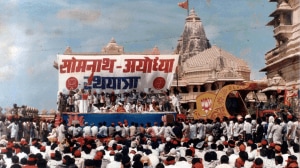Warrior tribe8217;s new battle, for survival
NAGPUR, JUNE 3: Meet Badal Bodhal Nade, 28. He's the proud recepient of a Higher Secondary Certificate degree. He's the only one in his tr...

NAGPUR, JUNE 3: Meet Badal Bodhal Nade, 28. He8217;s the proud recepient of a Higher Secondary Certificate degree. He8217;s the only one in his tribe, the Maratha Maang-Garodi, to have achieved this distinction in the past 60 years.
Nade now works as a peon with the Shikshak Sahakari Bank8217;s branch in Manewada, Nagpur. Had he grown up in Maang-Garodi Toli, a stinking slum settlement on the periphery of Nagpur city, Nade might just have brewed hooch or begged, like the rest of his clan. He got away because only because he lived and studied away; the rest of the Maang-Garodis who live in Toli have not had that opportunity.
The Maang-Garodis can still remember a past tinged with glory and valour, where they fought in the Maratha warrior king Shivaji8217;s army as warriors. Their present is far more grisly and harsh: they are scattered all over the backward Vidharba district and a part of them are perched on Nagpur8217;s margins, an island of neglect in the heart of the city.
The 40-odd families live in the settlement perched on the outskirts of Nagpur. Maang-Garodi Toli fits the archetype of urban India8217;s scourge: dingy houses, open nullahs bubbling with squalid effluents, naked children with dishevelled hair. The 3,000-odd tribals have been living here since 1939, but have been are cut off from a city that8217;s up and on the move.
Almost every household here makes liquor from mahua, a trade the tribals have been at for years. Nearly 1,000 litres of hooch are extracted everyday, and each family sells 6-7 litres at Rs 15 a bottle. That8217;s an average Rs 100 a day, but it8217;s not enough for the families which average 10-12 members. Often, they resort to begging and stealing, but then, this Scheduled Caste tribe can8217;t afford to have regrets.
8220;The area is a designated ward under the Nagpur Municipal Corporation NMC, yet, we have no water pipelines, sewerage lines and roads even though we pay taxes,8221; says Bodhal Jangluji Nade. Urinals constructed by the NMC for Rs 365 per unit have not served their purpose. 8220;It8217;s a sham,8221; Nade pithily says.
The municipal corporation runs a mobile hospital that doesn8217;t reach their parts, and there8217;s no public health centre nearby. More often than not, child births take place at home. This blocks the infants8217; future access to education, since getting a birth certificate which is necessary to enter schools is that much more difficult. The children are untouched by immunisation programmes. And since private treatment is expensive, they rely on self-medication, which can often mean swigging alcohol.
Toli is also swarming with children whose parents have left them behind and migrated to cities to beg. The parents return once the monsoon begins, says Rajput Mankar, who has the custody of his 8-year-old nephew Sandeep who has left the school as his parents have migrated.
The tribe8217;s criminal8217; background, particulary because of their hooch brewing, has worked against them. Bodhal Nade says: 8220;We have been stamped by the government and the society as plunderers. Whenever our youths seek employment, they are instantly rejected because they are Maang-Garodis.8221; Two or three unemployed youths have managed to get loans and run autorickshaws, while some others pull cycle-rickshaws. Deepak Sheshrao Londhe, a 12th class Arts student says, 8220;The mai-baap sarkar government has no schemes for us as we are not even educated and unemployed.8221;
8220;We fought a lost battle with the government for including us in the Nomadic Tribes category, but instead, we were listed in the Scheduled Caste category where the SC youths outnumber us heavily,8221; Nade points out. He did set up an organisation for the unemployed called the Swayamsevi Lokhand Raddi Kagad Feriwala Sahakari Sanstha. But the society is now on the verge of collapse for want of funds. As is another registered society, the Navjeevan Magasvargiya Shikshan Prasarak and Cultural Society. The state government8217;s efforts to help them have also been misguided 8211; the tribals dipped into aid granted by the government to buy Haryanvi buffaloes, but the breed could not survive in the local conditions.
The newly-elected Nagpur Mayor, Vasundhara Masurkar, was not even aware of the existence of the tribe in her city. 8220;I will look into their problems,8221; she assured.
Promises have come aplenty, change hasn8217;t. Some years ago, the Maang-Garodis sought deliverance from their status by deciding to embrace Christianity. They changed their mind after local leaders intervened. Will time bear out their decision?
- 01
- 02
- 03
- 04
- 05































